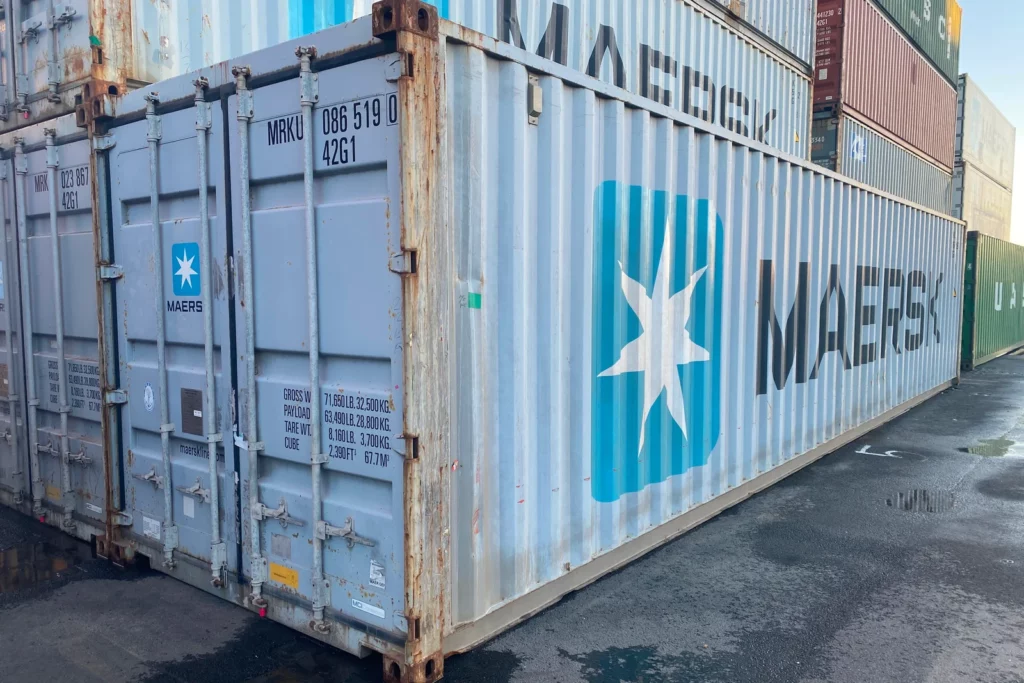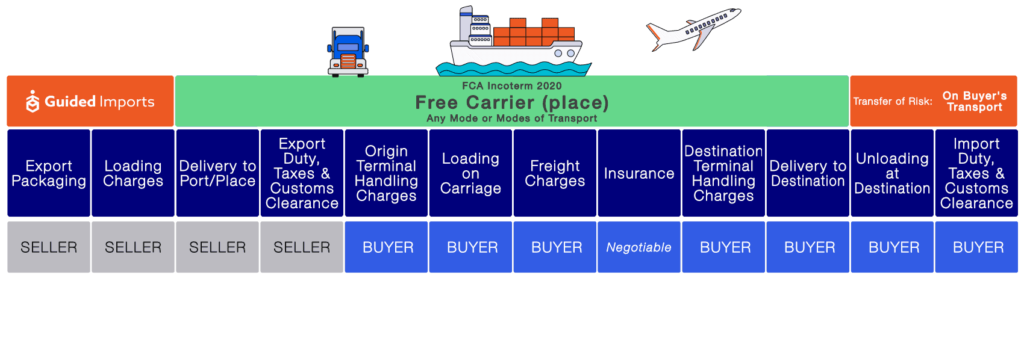Shipping is a critical component of the maritime industry, connecting businesses and consumers around the world. Whether you’re a small boating enthusiast or a large shipping company, understanding the various shipping terms and practices can greatly impact the efficiency and profitability of your operations.
One such shipping term is FCA, which stands for Free Carrier. In this article, we’ll dive into the meaning of FCA shipping terms, explore their benefits, and provide best practices for maximizing your shipping efficiency.

What are FCA Shipping Terms?
FCA stands for “Free Carrier” and refers to a set of shipping terms used in international trade. These terms specify the responsibilities and obligations of both the seller and the buyer when it comes to the delivery of goods.
In an FCA transaction, the seller is responsible for delivering the goods to the carrier nominated by the buyer at the seller’s premises or another named place. The delivery of goods is considered complete once the goods have been handed over to the carrier.

Why are FCA Shipping Terms Important?
FCA shipping terms are important because they provide a clear and mutually agreed-upon understanding of the responsibilities and obligations of both the buyer and the seller in a shipment transaction.
These terms ensure that both parties are on the same page when it comes to delivery and can help to prevent misunderstandings or disputes.
How FCA Shipping Terms Impact Your Business
Using FCA shipping terms can have a significant impact on your business. They can help to reduce costs, increase efficiency, and mitigate risk in the shipping process. They also provide a clear understanding of the responsibilities and obligations of both parties in a shipment transaction, helping to prevent misunderstandings or disputes.
FCA shipping terms offer a number of advantages to businesses looking to streamline their shipping operations. In this section, we’ll discuss the key benefits of using FCA shipping terms in your shipping operations.
FCA Shipping Terms and Cost Savings
One of the biggest advantages of FCA shipping terms is that they can help you save money on shipping costs. This is because under FCA shipping terms, the seller is responsible for getting the goods to the carrier, but the buyer is responsible for paying for shipping. This can be a cost-effective solution for buyers, especially when shipping large or heavy goods, as the seller is often better equipped to handle these types of shipments.
FCA Shipping Terms and Increased Efficiency
Another key benefit of FCA shipping terms is that they can help increase efficiency in your shipping operations.
By shifting some of the responsibility for shipping from the buyer to the seller, you can streamline your processes and ensure that goods are shipped more quickly and efficiently.
This can be especially important when shipping goods internationally, as cross-border shipments can often be more complex and time-consuming.
Risk Mitigation with FCA Shipping Terms
In addition to cost savings and increased efficiency, FCA shipping terms can also help mitigate risks associated with shipping goods.
By using FCA shipping terms, you can reduce your exposure to risks such as lost or damaged goods, as the seller is responsible for getting the goods to the carrier.
This can help protect your business and ensure that you are able to receive the goods you need when you need them.
FCA Shipping Terms in International Trade
FCA shipping terms are also commonly used in international trade, as they can offer a number of advantages when shipping goods between countries.
In this section, we’ll discuss the use of FCA shipping terms in international trade and the key benefits they offer.
FCA Shipping Terms and Incoterms
FCA shipping terms are often used in conjunction with Incoterms, which are standardized trade terms used in international trade. Incoterms specify the responsibilities of both the buyer and the seller when shipping goods between countries, and they are used to help reduce the risk of misunderstandings or disputes.
By using FCA shipping terms in conjunction with Incoterms, you can ensure that your international shipping operations are clear and efficient.
Using FCA Shipping Terms in Cross-Border Shipping
When shipping goods between countries, it’s important to consider the specific requirements and regulations of each country.
Using FCA shipping terms in cross-border shipping can help simplify this process, as the seller is responsible for getting the goods to the carrier.
This can help ensure that your goods are shipped quickly and efficiently and that you are able to meet the requirements of both the country of origin and the country of destination.
Advantages of FCA Shipping Terms in International Trade
The use of FCA shipping terms in international trade can offer a number of advantages, including cost savings, increased efficiency, and risk mitigation. By using FCA shipping terms, you can ensure that your international shipping operations are clear and efficient and that you are able to receive the goods you need when you need them. This can be especially important when shipping goods across borders, as cross-border shipments can often be more complex and time-consuming.
FCA Shipping Terms Best Practices
Proper document preparation is a key aspect of utilizing FCA shipping terms to their fullest potential.
This involves ensuring that all relevant documentation is in order and complete, including bills of lading, invoices, and any other necessary documents.
It is important to carefully review all documents to ensure that they accurately reflect the terms of the FCA agreement and that they are in line with any relevant regulations and laws.
FCA Shipping Terms and Contract Negotiations
Contract negotiations play an important role in ensuring that FCA shipping terms are utilized to their fullest potential. In these negotiations, it is important to clearly communicate the terms of the FCA agreement and to ensure that both parties fully understand their obligations and responsibilities.
This may involve clarifying any ambiguities or uncertainties in the agreement, and negotiating any necessary changes to ensure that both parties are satisfied with the terms.
Ensuring Compliance with FCA Shipping Terms
Ensuring compliance with FCA shipping terms is critical to maximizing the benefits of these terms. This may involve regularly monitoring the progress of shipments, and taking steps to address any issues or deviations from the terms of the agreement.
It is also important to maintain open communication with all parties involved in the shipping process, to ensure that any necessary adjustments or modifications to the agreement can be made in a timely and effective manner.
FCA Shipping Terms and Risk Management
Effective risk management is a key aspect of utilizing FCA shipping terms. This involves identifying any potential risks associated with the terms, such as the risk of loss or damage to the goods being shipped, or the risk of financial loss due to disputes over payment or other issues.
By identifying these risks, it is possible to take proactive steps to mitigate them and minimize their impact on the overall shipping process.
Managing Risks with FCA Shipping Terms
Once risks have been identified, it is important to take steps to manage them. This may involve implementing additional controls or processes to minimize the risk of loss or damage to the goods, or negotiating changes to the terms of the agreement to better address potential issues. It is also important to regularly monitor the shipping process and take action as necessary to address any emerging risks.
Avoiding Common Mistakes with FCA Shipping Terms
By avoiding common mistakes, it is possible to maximize the benefits of FCA shipping terms while minimizing any associated risks. This may involve avoiding overloading containers, failing to secure goods properly, or neglecting to keep detailed records of the shipping process.
Taking these steps and being proactive in managing risks makes it possible to utilize FCA shipping terms and achieve optimal results effectively.
Working with Freight Forwarders and FCA Shipping Terms
When it comes to maximizing the benefits of FCA shipping terms, working with a reputable and experienced freight forwarder can be a huge help.
Freight forwarders can help you navigate the complexities of international trade, including compliance with incoterms and FCA shipping terms.
They can also help you find the best shipping options for your needs and negotiate with carriers on your behalf.
Choosing the Right Freight Forwarder for FCA Shipping Terms
When choosing a freight forwarder, it’s important to consider their experience and expertise in FCA shipping terms.
You’ll want to work with a forwarder who has a deep understanding of FCA shipping terms, as well as the incoterms that apply to your shipments. You should also consider a freight forwarder’s reputation, as well as its network of carriers and its track record of success.
Maximizing Benefits of FCA Shipping Terms with Freight Forwarders
By working with a freight forwarder who specializes in FCA shipping terms, you can maximize the benefits of these terms for your business.
With the right forwarder, you can enjoy greater cost savings, increased efficiency, and better risk management, among other benefits.
Your forwarder can also help you stay up-to-date with any changes in shipping regulations and ensure that your shipments comply with all relevant laws and regulations.
Conclusion: FCA Shipping Terms and Your Business
In conclusion, FCA shipping terms offer numerous benefits for businesses that engage in international trade.
From cost savings and increased efficiency to better risk management, FCA shipping terms can help you maximize your shipping efficiency and improve your bottom line.
Why You Should Embrace FCA Shipping Terms
If you’re looking to streamline your shipping operations and enjoy greater cost savings and efficiency, FCA shipping terms are definitely worth considering. Whether you’re a seasoned veteran of international trade or just starting out, embracing FCA shipping terms can be a smart move for your business.
Final Thoughts on FCA Shipping Terms and Their Importance for Your Business
In today’s fast-paced and competitive global marketplace, FCA shipping terms are increasingly important for businesses looking to stay ahead of the curve. By adopting these terms and working with a reputable and experienced freight forwarder, you can stay ahead of the competition and enjoy greater success in international trade.
In conclusion, FCA shipping terms are an essential part of the shipping and logistics industry, providing numerous benefits to businesses in terms of cost savings, increased efficiency, and risk mitigation. Whether you are involved in international trade or domestic shipping, understanding the best practices and guidelines for FCA shipping terms can help you maximize the benefits of this delivery option and achieve your business goals.
FCA shipping terms also play a critical role in the relationship between businesses and their freight forwarders, as choosing the right freight forwarder can help you achieve even greater cost savings and efficiency. In the end, it all comes down to the bottom line and how FCA shipping terms can impact your business.
So, if you want to enhance your shipping efficiency, mitigate risks, and boost your bottom line, embracing FCA shipping terms is an excellent place to start. Make sure to familiarize yourself with the basics of FCA shipping terms and how to implement them effectively, and you will be well on your way to achieving success in your shipping and logistics operations.
- 10 Boat Salvage Yards in California – January 25, 2025
- 13 Boat Salvage Yards in Texas – January 18, 2025
- 7 Boat Salvage Yards in Michigan – January 15, 2025



